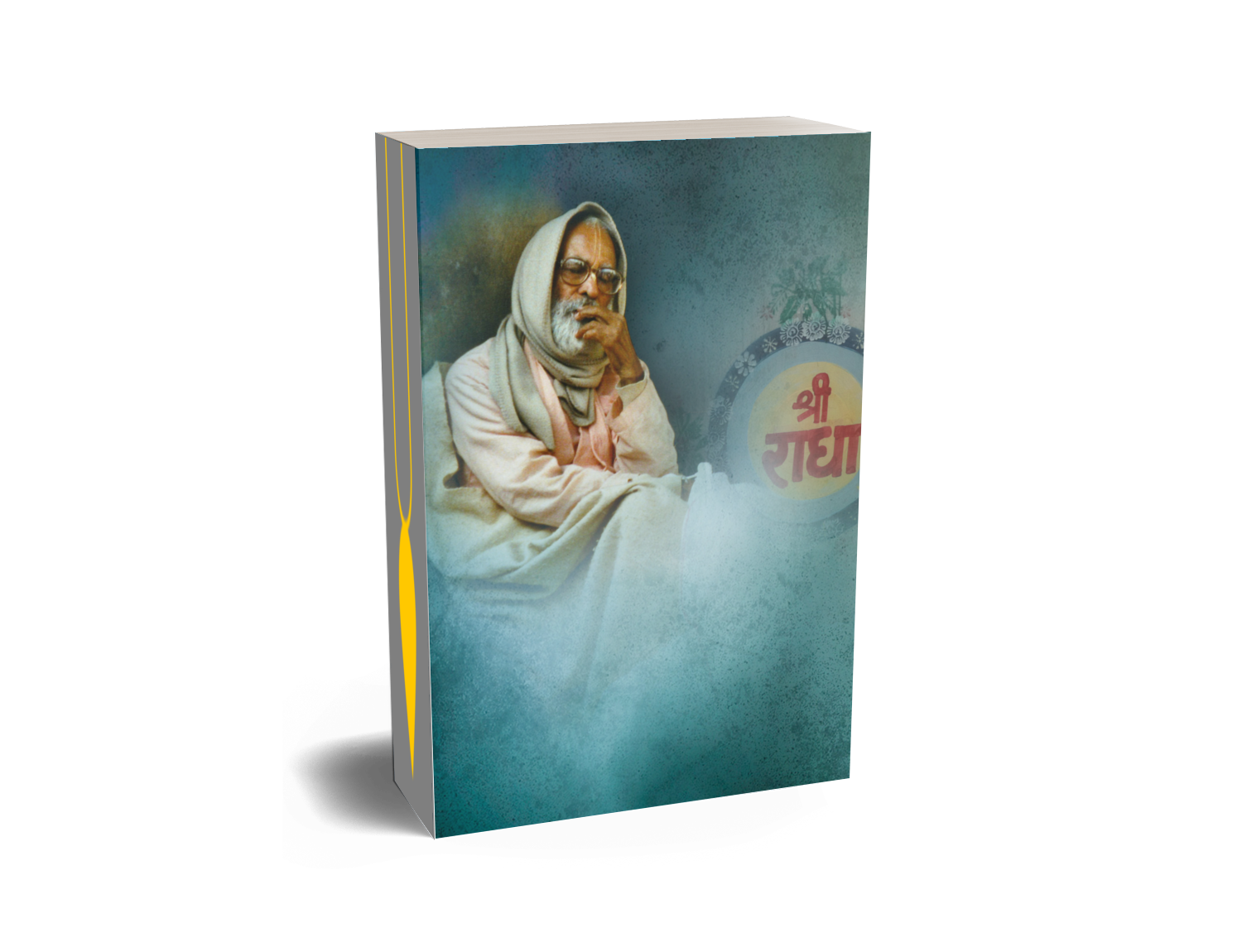

Chapter 4 from the book, The Nectar of Govinda-līlā, 4th edition (Second Printing), by Śrīla Bhaktivedānta Nārāyaṇa Mahārāja
Chapter Four
Vasanta-pañcamī
Vasanta-pañcamī is the first day of the vasanta, or spring, season. Vasanta-pañcamī and the spring season have 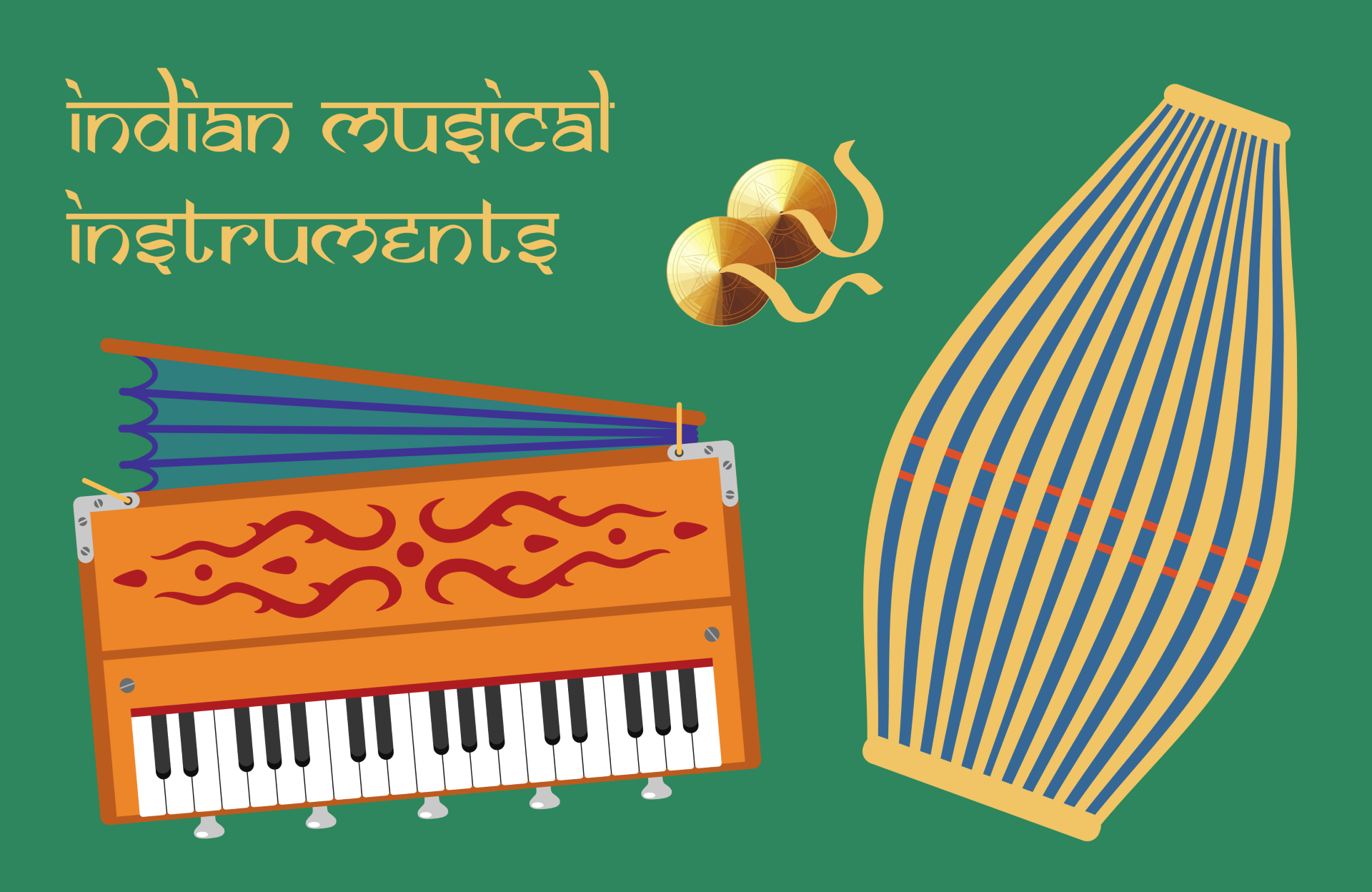 their own special importance, and especially Hindu people celebrate this with great respect. On this day, we pick the mustard flower, barley and wheat, and offer them to our favourite deity. From today, taking drums, karatālas and different kinds of instruments, we play vasanta-rāgas, special melodies for the spring season, and the festival of Holī begins. There will be so many songs and kīrtanas, and all are related to Śrī Rādhā and Kṛṣṇa. In previous times this was done even more, but now society has changed somewhat. Still there is great enthusiasm for this festival.
their own special importance, and especially Hindu people celebrate this with great respect. On this day, we pick the mustard flower, barley and wheat, and offer them to our favourite deity. From today, taking drums, karatālas and different kinds of instruments, we play vasanta-rāgas, special melodies for the spring season, and the festival of Holī begins. There will be so many songs and kīrtanas, and all are related to Śrī Rādhā and Kṛṣṇa. In previous times this was done even more, but now society has changed somewhat. Still there is great enthusiasm for this festival.
This time of year, in the trees, creepers, animals, birds, in any conscious entity, rasa seems to increase. In the mango tree, flower buds will certainly appear. In the groves of mango trees, the cuckoo will eat these buds and start making a kū-kū sound. The trees and creepers will shed their old leaves and change, and be newly decorated with new, soft, red leaves. It is as if they have come to participate in Śrī Kṛṣṇa’s vasantī-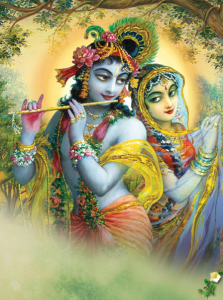 rāsa, and with their new decoration, they are encouraging Him. All of nature at once changes; such is the spring season.
rāsa, and with their new decoration, they are encouraging Him. All of nature at once changes; such is the spring season.
Also, in Vraja, from this very day, Kṛṣṇa and the gopīs begin their vasantī-rāsa. There is one rāsa called śāradīya-, or autumn, rāsa, and another called vasantī-rāsa. On this day, in Bengal, there is the worship of the goddess Sarasvatī. Bengal is mainly a province of śāktas, those who worship śakti, potency. From the potency of Rādhikā come Sarasvatī and Durgā, and according to our line of thought, there is no special difference between Sarasvatī and Durgā. With great decoration the Bengalis worship Sarasvatī, the goddess of knowledge. We worship Śuddha-Sarasvatī, the dear potency of Bhagavān who makes the jīvas move in the direction of Bhagavān. There is also Vimalānanda-Sarasvatī, who is the servant of Śuddha-Sarasvatī and another form of her. Vimala means pure: she who in pure form gives great pleasure (ānanda) to Kṛṣṇa is known as Vimalānanda-Sarasvatī. She bestows knowledge throughout the entire universe, and the people of the world serve her. Because Śuddha-Sarasvatī is the root cause of the good opportunity to hear pure hari-kathā, first of all we should offer praṇāma to her, and then we may make an effort to enter into everything related to vasantī-rāsa.
Kṛṣṇa has different rāsas at different times. Amongst them, śāradīya-rāsa and vasantī-rāsa have their own special importance. To give great pleasure to all of the nitya-siddha-gopīs and sādhana-siddha-gopīs, Kṛṣṇa commences the śāradīya-rāsa. No activity or pastime of Kṛṣṇa is done for His own pleasure, whereas any activity that we 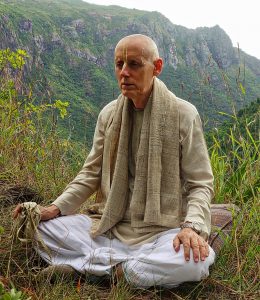 do, even up to serving the deity, is done for our own pleasure. We are serving the guru for what? To get some future pleasure from it, so we will attain something. We may be performing bhajana, but in doing that, the idea of giving pleasure to Kṛṣṇa is secondary. It should be the prime consideration, but in our conditioned state we are serving merely for our own peace of mind. That which we do for ourselves is not bhakti. Gradually, when what we do becomes solely for the pleasure of Kṛṣṇa and His associates, then only will it be bhakti. It must be purely for Kṛṣṇa, for Rādhā, for Their associates, and then it will be śuddha-bhakti, unalloyed devotion.
do, even up to serving the deity, is done for our own pleasure. We are serving the guru for what? To get some future pleasure from it, so we will attain something. We may be performing bhajana, but in doing that, the idea of giving pleasure to Kṛṣṇa is secondary. It should be the prime consideration, but in our conditioned state we are serving merely for our own peace of mind. That which we do for ourselves is not bhakti. Gradually, when what we do becomes solely for the pleasure of Kṛṣṇa and His associates, then only will it be bhakti. It must be purely for Kṛṣṇa, for Rādhā, for Their associates, and then it will be śuddha-bhakti, unalloyed devotion.
Kṛṣṇa is Himself the crown jewel of those who are ātmārāma and āptakāma: He has no unfulfilled desire. All of His desires are satisfied, so He doesn’t need to take anything from anyone to become complete. In living entities we find this quality of incompleteness: in our happiness, knowledge, renunciation or whatever, we are not complete. By taking from Kṛṣṇa, or taking from other people, we want to become complete, but Kṛṣṇa is ātmārāma and āptakāma. He needs nothing to enjoy, but upon seeing the desires of His devotees, the desire to enjoy arises within Him.
bhagavān api tā rātṛīḥ
śāradotphulla-mallikāḥ
vīkṣya rantuṁ manaś cakre
yoga-māyām upāśritaḥ
Śrīmad-Bhāgavatam (10.29.1)
Bhagavān Śrī Kṛṣṇa, witnessing the arrival of those autumn nights scented with blossoming jasmine flowers, desired to enjoy loving affairs, and for this purpose He employed His Yogamāyā potency.
Bhagavān is āptakāma, but still there is some desire in His heart because He is rasika, and also raso vai saḥ – the emporium of rasa. There is also desire in the hearts of the gopīs to taste that rasa. Although Kṛṣṇa is ātmārāma and āptakāma, today He will be drowned in rasa because within the gopīs is the desire that Kṛṣṇa will be pleased. For this purpose they worshipped the goddess Kātyāyanī, and one year before, during the month of Kārttika, she gave them a boon, and now their hearts are eager for the fulfilment of that boon.
The description of śāradīya-rāsa has been given in Śrīmad- Bhāgavatam, and it is very beautiful and pleasing to the heart. Vasantī-rāsa has been described in Gīta-govinda by Śrī Jayadeva Gosvāmī. One other topic of rāsa, āścarya-rāsa, has been described by Prabodhānanda Sarasvatī in a small book of Sanskrit poetry named Āścarya-rāsa-prabandha.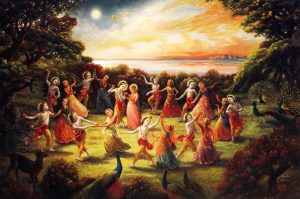
What is the meaning of rāsa? Maṇḍalī-vādya-nātya: when in an independent way, one hero and many different heroines come together and dance to instruments playing scriptural music, it is called rāsa. This particular type of dancing has been described in the scriptures, and we do not see that this rāsa is performed by any other incarnation of Bhagavān besides Kṛṣṇa. They are able to do it, but have not, so then what to speak of any human being. If any human does this, it is called lust and considered degraded behaviour. When those devotees who for millions of births have rejected worldly desires and pleasures and have performed bhajana with the sentiment of the gopīs, for the pleasure of Kṛṣṇa meet together in a group in an independent, free way, dancing to different instruments playing scriptural music, that is rāsa. But the scriptures have accepted this in relation to Kṛṣṇa only, and rejected any possibility of it being related to anyone else. Kṛṣṇa and the gopīs are engaged in the rāsa dance for each other’s pleasure, and in this there is such an increase in prema that you will not find it fully described in any scripture.
Therefore Kṛṣṇa Himself, the crown jewel of all performers of pastimes, has said, “Upon coming together for this rāsa dance, what has happened within My heart? In My  heart what are the feelings, and how are they arising?”
heart what are the feelings, and how are they arising?”
Just as milk is heated and boils over, the waves within Kṛṣṇa’s heart are such that He Himself is unable to describe them. And it is the same for the gopīs also: when you have forgotten your own body, what can you describe? Therefore a few elevated personalities, such as Vyāsadeva, in the trance of meditation saw this phenomenon from a position of neutrality. Otherwise they would have become emotionally involved in it and become bewildered also. The gopīs were bewildered, Kṛṣṇa was bewildered, and unless one was seeing it from an aloof position, one would not be able to describe it. Therefore Vyāsa was able to describe a little of it.
The goddess Kātyāyanī had given the gopīs a boon, and on the day of Śāradīya-pūrṇimā, Kṛṣṇa saw the moon in a special way. In the autumn season, when the moon is full, there are no clouds, smoke or dust in the sky, and all becomes clear. The season itself is very beautiful. It is not too hot or too cold, and by the influence of the moon all kinds of flowers bloom. In the early evening, the sun sets, and the full moon casts red rays on his dear one, the personification of the eastern direction. Our  commentators have said that when Kṛṣṇa saw the moon, He remembered, “Oh, yes. We are members of the Candra (moon) dynasty, and the original head of the Candra dynasty is this very Candra whom I see now. Tonight the indication has arisen in My heart that the eastern direction is really the wife of Sūrya, the sun. I am similarly applying colour to the faces of the gopīs, meaning that I am enjoying amorous pastimes with them, and in this there is no fault, especially since I am actually the husband of the entire world.”
commentators have said that when Kṛṣṇa saw the moon, He remembered, “Oh, yes. We are members of the Candra (moon) dynasty, and the original head of the Candra dynasty is this very Candra whom I see now. Tonight the indication has arisen in My heart that the eastern direction is really the wife of Sūrya, the sun. I am similarly applying colour to the faces of the gopīs, meaning that I am enjoying amorous pastimes with them, and in this there is no fault, especially since I am actually the husband of the entire world.”
Seeing the moon, this inspiration arose in Him. At that time He remembered that a boon had been given to the gopīs who had been performing austerities for millions of births, and it was pūrṇimā, the full moon and the last day of the month for pūjā. They were new gopīs, young girls, and they gave invitations to Rādhikā, Viśākhā, Lalitā and all of the gopīs of Vraja-maṇḍala: “Today please come and join us in our pūjā.” So on that day when their worship was to be completed, Rādhikā, Viśākhā and Lalitā joined them, but they didn’t participate in the worship. Why? Because they had already been married, so for them there was no necessity of saying, “We desire to have the son of Nanda as our husband.” But all of them were present there, and on that very day Kṛṣṇa took their clothes and gave them all a boon. He thought, “Today, I will fulfil the desires of their hearts.”
He played His flute, and when all of the gopīs came there, He said, “I have already had darśana of all of you, so now please return home. Your duty is to serve your husbands.”
The gopīs replied, “Who in this world can be a guru like You? You are our gurudeva. There is no instruction as beautiful as that which you have just given us. Telling us to serve our husbands – there is no greater instruction than this, so then You are our guru. Previously we were offering pūjā to Kātyāyanī, and now we have attained Your service, so You are our gurudeva. Therefore accept the pūjā we offered before, and if You don’t, then You are not fulfilling Your words, and the reaction to committing aparādha will come upon You.
ye yathā māṁ prapadyante
tāṁs tathaiva bhajāmy aham
Bhagavad-gītā (4.11)
“‘As they surrender unto Me, I reward them accordingly’ – these are Your words. Please fulfil the desires of our worship. To You we have only brought ourselves; we have nothing more to offer You, so please be happy. Before, in our pūjā, we offered dried fruit, rock candy and sweets – whatever we had, we offered to Kātyāyanī in our pūjā, but in reality it was all meant for You. Please accept it, otherwise You are not fulfilling Your words.”
Kṛṣṇa could not defeat them with words. In his description of āścarya-rāsa, Prabhodānanda Sarasvatī has shown these things a little differently. He has written that on that day Kṛṣṇa called through the flute, “Rādhe! Rādhe!” and each of the gopīs thought, “He is calling my name!”
jagau kalaṁ vāma-dṛśāṁ manoharam
Śrīmad-Bhāgavatam (10.29.3)
The meaning of this is very beautiful. Jagau means “played”, and manoharam means “he who steals the heart”. He played His flute in such a way as to steal the attention of the whole world, and all the gopīs became automatically attracted. Kṛṣṇa, by His beauty, by His qualities, by His affection, by His rasa and by all the other specialities of His style, stole the hearts of all living entities. He sent a messenger from house to house. How did He send it? By His lips, through the medium of His flute, all the rasa of His heart was expressed in His calling of the gopīs. The wood of the flute, bamboo, is generally dry, but He injected it with rasa. He gave a little blow into the flute, and from it came a very peculiar vibration, the likes of which He could not have made with His mouth alone.
Emerging from the flute, the vibration saw that in the entire universe there was no fit 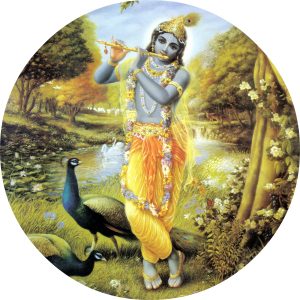 receptacle for it, so it crossed over the entire material universe (brahmāṇḍa). Going up from there, it also crossed Vaikuṇṭha, and even crossed Mathurā and Dvārakā. Entering Vraja this sweet vibration stunned and bewildered everyone, and put them to sleep. All of the older ladies of Vraja became unconscious and knew nothing of what was happening. The sakhās also remained sleeping. Then, for making the gopīs give themselves to Kṛṣṇa, that vibration arrived at their ears and saw that the door was open. Coming across an open door, it immediately entered through the medium of their ears, and came to the most valuable of all things: their hearts. The patience of the heart, the fear and shyness towards guru – whatever was there, it plundered everything. And only when it was leaving did the gopīs come to know of it and say, “Where have our hearts gone?” They saw that a thief had come and is going away, where? In the direction from which that vibration came, so they ran there.
receptacle for it, so it crossed over the entire material universe (brahmāṇḍa). Going up from there, it also crossed Vaikuṇṭha, and even crossed Mathurā and Dvārakā. Entering Vraja this sweet vibration stunned and bewildered everyone, and put them to sleep. All of the older ladies of Vraja became unconscious and knew nothing of what was happening. The sakhās also remained sleeping. Then, for making the gopīs give themselves to Kṛṣṇa, that vibration arrived at their ears and saw that the door was open. Coming across an open door, it immediately entered through the medium of their ears, and came to the most valuable of all things: their hearts. The patience of the heart, the fear and shyness towards guru – whatever was there, it plundered everything. And only when it was leaving did the gopīs come to know of it and say, “Where have our hearts gone?” They saw that a thief had come and is going away, where? In the direction from which that vibration came, so they ran there.
When I joined the mission, there was an older brahmacārī who would sit in the corner  and chant japa, facing the wall so that nothing would distract him. Every day he would chant one lākha of harināma. One day while he was sitting quietly and chanting, he heard a noise, and not fully to his external senses, he looked to one side and saw a thief escaping with a money box. As he got up to pursue the thief, his dhotī began to fall down, so he clutched it with one hand. With the other hand he was still taking harināma – he didn’t leave his harināma! In this very state, with one hand on his chanting beads and the other hand holding up his dhotī, yelling “Thief! Thief!” he ran after him. Then his foot got caught in his dhotī and he almost fell! At that time he was not completely to his external senses, so how could he catch the thief? He couldn’t catch him, but he ran after him in that condition anyway. Finally more people came and the thief was caught.
and chant japa, facing the wall so that nothing would distract him. Every day he would chant one lākha of harināma. One day while he was sitting quietly and chanting, he heard a noise, and not fully to his external senses, he looked to one side and saw a thief escaping with a money box. As he got up to pursue the thief, his dhotī began to fall down, so he clutched it with one hand. With the other hand he was still taking harināma – he didn’t leave his harināma! In this very state, with one hand on his chanting beads and the other hand holding up his dhotī, yelling “Thief! Thief!” he ran after him. Then his foot got caught in his dhotī and he almost fell! At that time he was not completely to his external senses, so how could he catch the thief? He couldn’t catch him, but he ran after him in that condition anyway. Finally more people came and the thief was caught.
At the time when Kṛṣṇa played the flute, the gopīs were in a similar condition. It was early evening. One gopī was serving her husband, another was milking a cow, another was cooling milk by pouring it from one vessel to another, another was decorating herself, and others were doing other things. So when the thief comes, if there is a delay of even one moment, it won’t be possible to catch him. Therefore the gopīs immediately ran after Him. Some had applied make-up to only one eye, and the remainder was in their hands as they left. Others, in a bewildered state, dressed themselves in a disorderly fashion, and as they went, their clothes were dragging on the ground. Not fully externally aware, they arrived in the arena of rāsa. This is called śāradīya-rāsa.
During that rāsa, Kṛṣṇa’s dearmost gopī exhibited some jealous anger. Kṛṣṇa was thinking, “I am enjoying with so many gopīs; no one is as fortunate as Me.” But this gopī thought, “All are equal to Me? He told Me that I was the dearest to Him, and here I see that He is a liar. He is dancing and singing with everyone.” Therefore She exhibited māna, jealous anger. Then Kṛṣṇa grabbed Her and disappeared on the path. The gopīs began searching. Searching and searching, they saw a pair of footprints, and along with them was the footprint of some kiśorī. One group of gopīs understood whose footprint that was, but the sakhīs in the mood of Candrāvalī didn’t understand whose it was.
anayārādhito nūnaṁ
bhagavān harir īśvaraḥ
yan no vihāya govindaḥ
prīto yām anayad rahaḥ
(Śrīmad-Bhāgavatam 10.30.28)
The gopīs thought, “Certainly this particular gopī has worshipped Śrī Govinda the best, therefore He has left us and taken only Her with Him.” Those who were servants of that gopī recognised Her footprint and were very, very happy. “Today the Lord has taken our sakhī and vanished!” As they went further and further, these gopīs felt increasing ānanda, but the others were feeling separation. “We see that Her footprints stop here – where has She gone? Definitely that gopī had become tired, and therefore He lifted Her up and carried Her on His shoulders.”
When they went a little further ahead, the gopīs noticed a place on the ground where someone had been sitting, and near it some flowers had fallen. There were also some toe-prints on the ground. “It seems that here Kṛṣṇa has stood on His toes to pick flowers, so here He has certainly decorated Her with them.” They went a little further ahead and saw that very sakhī, alone and lamenting, and some said, “Oh, it was this sakhī Kṛṣṇa had taken with Him!” Seeing Her crying and crying, the other gopīs felt some sympathy for Her. Leaving Her behind, Kṛṣṇa had gone on His way; otherwise they would have been jealous of Her.
There are so many beautiful things described therein Chapters 29–33 of the Tenth Canto. In the end, they again met Kṛṣṇa. He appeared before them, a little ashamed, and said, “Sakhīs, I am certainly very grateful to you.” They put a question about loving reciprocation to Him, and His answer was very beautiful. Here we complete our summary of śāradīya-rāsa.
Caitanya Mahāprabhu, Rāya Rāmānanda, Svarūpa Dāmodara and Śrīvāsa Paṇḍita 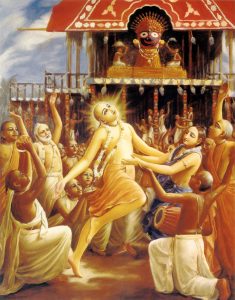 were together at the Ratha-yātrā festival. It was the day of Herā-pañcamī. At that time, in a drama that was being enacted for the Lord’s pleasure, Śrīvāsa saw that the maidservants of Lakṣmī-devī had arrested the gopīs and were harassing them. As a form of taxation they were snatching their ornaments and punishing them. Very happily they were playing horns, laughing and saying, “Hey cowherds, you work only with milk, and you want to be equal to Lakṣmī-devī, the goddess of fortune? Today she will teach you a good lesson!”
were together at the Ratha-yātrā festival. It was the day of Herā-pañcamī. At that time, in a drama that was being enacted for the Lord’s pleasure, Śrīvāsa saw that the maidservants of Lakṣmī-devī had arrested the gopīs and were harassing them. As a form of taxation they were snatching their ornaments and punishing them. Very happily they were playing horns, laughing and saying, “Hey cowherds, you work only with milk, and you want to be equal to Lakṣmī-devī, the goddess of fortune? Today she will teach you a good lesson!”
They were taking some of the gopīs’ clothing and beating them with that, and taking some taxation from them. Seeing all of this, Śrīvāsa Paṇḍita was very pleased, and said, “Just see! What is there in Vṛndāvana? The garlands there are composed merely of guñjā flowers. Where would they get good quality ornaments? All they have are these ornaments made of flowers, and they are wearing these things. Their opulence is petty in comparison to the massive opulence of Lakṣmī.”
Then Svarūpa Dāmodara said, “What is the nature of the gopīs’ ankle bracelets? They are more valuable than the diamonds on Lakṣmī-devī’s head. Only these simple flowers are necessary for them to attract Śrī Kṛṣṇa. Since nothing else is necessary, their opulence is the highest.” In this way he described the greatness of the gopīs.
Mahāprabhu said, “He is correct. I agree that the prema of the gopīs is the highest of all – it is even higher than that of Lakṣmī. And amongst all of the gopīs who is the best?”
Svarūpa Dāmodara replied, “Rādhikā. Rādhikā’s prema is the most advanced of all.”
“How?”
“In the rāsa-līlā, Kṛṣṇa left all others and vanished, taking only Her. He took Her in a deceptive way.”
“Why with deception?
“Because He was afraid of the other gopīs. If He had taken Her in front of everyone, then perhaps Candrāvalī and the others would have become jealous of Rādhikā’s love.”
Mahāprabhu said, “We don’t want to hear about Him stealing Her. Because the name of the particular gopī that He took is not mentioned in the Bhāgavatam, it could have been Candrāvalī or any other gopī. Please tell us how Kṛṣṇa directly considers Rādhā only to be the best.”
Here we turn to Jayadeva’s description of vasantī-rāsa: “My heart is palpitating, for I desire to write such a thing which in this life I have not written before, and which is not mentioned anywhere: that Kṛṣṇa will fall at the feet of Rādhikā. We know it well, but Kṛṣṇa is the Supreme Controller, the cause of all causes, and the source of all other incarnations. That He falls at the feet of His own potency who is the form of His maidservant – I don’t know if this is proper, but my heart is saying that without Kṛṣṇa putting His head at Her feet, She will not be appeased! I don’t know if I am able to write it.”
Jayadeva goes on to describe that on the plains of Girirāja-Govardhana, at Candra-sarovara, Candra remained throughout the whole of one of Brahmā’s nights. What is the duration of Brahmā’s night? Millions of yugas. In order to witness the rāsa-līlā he stayed there, so it is called Candra-sarovara.
In the spring season, all of the fruits and flowers in Vṛndāvana come out. The she- cuckoo starts her kū-kū sound, the peacock starts his ke-kā sound, and it is as if the pigeons are playing the conchshell, making their ko-ko sounds. They are all making their own sounds, and collectively it sounds as if they are playing a śahanāī. In this way all of the birds and animals become happy, and there is no one who is not dancing. Forming groups, Kṛṣṇa and the gopīs start dancing. All young unmarried girls are present there, and they had been waiting for one year. For dancing with Kṛṣṇa, for meeting Kṛṣṇa – for a whole year a fire of separation had been burning inside them. Not for themselves, not for lust, but for mitigating this separation.
cuckoo starts her kū-kū sound, the peacock starts his ke-kā sound, and it is as if the pigeons are playing the conchshell, making their ko-ko sounds. They are all making their own sounds, and collectively it sounds as if they are playing a śahanāī. In this way all of the birds and animals become happy, and there is no one who is not dancing. Forming groups, Kṛṣṇa and the gopīs start dancing. All young unmarried girls are present there, and they had been waiting for one year. For dancing with Kṛṣṇa, for meeting Kṛṣṇa – for a whole year a fire of separation had been burning inside them. Not for themselves, not for lust, but for mitigating this separation.
For really becoming immersed in Kṛṣṇa’s rasa, one must enter into this poetry composed by Jayadeva Gosvāmī. Therefore Caitanya Mahāprabhu, His heart full of rasa, at night would tell Svarūpa Dāmodara, “Please recite Gīta-govinda for Me.” Hearing it, immediately His pleasure would increase. Svarūpa Dāmodara would read precisely what Caitanya Mahāprabhu desired to hear. Sometimes it was the poetry of Jayadeva, sometimes Caṇḍīdāsa, sometimes Vidyāpati, and sometimes he would read verses from the five chapters describing the rāsa dance in Śrīmad-Bhāgavatam.
The gopīs were clapping their hands as if they were karatālas, and they played drums, the vīṇā and the sitāra. It was divinely beautiful as the gopīs played one rāga after another. There are some melodies in which there is no rasa, so they played only the rāgas that increased the rasa. Kṛṣṇa sang in a very high pitch, and in different melodies. The gopīs then sang one song in a higher pitch than Kṛṣṇa. He wanted to sing higher, but couldn’t, and He could only say, “Sādhu! Sādhu! (Very nice! Very nice!)” Kṛṣṇa was dancing, and with Śrīmatī Rādhikā, He danced with such speed and dexterity that He Himself was astonished, and again He chanted, “Sādhu! Sādhu!”
With one gopī Kṛṣṇa was holding hands, with another He was dancing by jumping up and down, another He was embracing, and another He was kissing on the hand. Sometimes, with His eyes half-open in great prema, He would look in the direction of a particular gopī. He would follow a certain rhythm of racing behind one gopī after another, and this is how vasantī-rāsa is described.
In a fraction of a second, as short as the blink of the eyes, thousands more gopīs arrived and started dancing. Rādhikā saw that at that time Kṛṣṇa’s topmost, supremely powerful potency (param-aiśvarya-śakti) was not working; He had stopped it. Here He kept the cause behind pastimes, Yogamāyā, separate from Him. He placed all of these potencies far away by telling them, “At this time you will not do anything; for now you just sit quietly and watch.” In this pastime of Kṛṣṇa, everything was forgotten. Here, because aiśvarya was not manifest, Kṛṣṇa didn’t know that “I am Bhagavān,” and the gopīs didn’t know that “We are Īśvarī, we are the root of Yogamāyā.” All was forgotten.
After a little while, Rādhikā saw, “Kṛṣṇa is a big cheater. He is cheating Me. He seems to be dancing only with Me, but actually He is dancing with everyone. Only because of His speed and dexterity does it seem that He is alone with Me.”
Then Rādhikā exhibited some māna, jealous anger. If we feel this emotion, there is 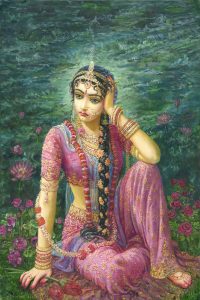 some selfishness in it, but in the hearts of devotees there is no selfishness. In Her heart there is never any envy, but even if there is some, it is only a transformation of prema and mahābhāva. Don’t consider this to be a deformation, but rather an aspect of Her variegatedness, Her speciality.
some selfishness in it, but in the hearts of devotees there is no selfishness. In Her heart there is never any envy, but even if there is some, it is only a transformation of prema and mahābhāva. Don’t consider this to be a deformation, but rather an aspect of Her variegatedness, Her speciality.
There is milk: add some sugar, and it becomes sweet. Mix a little kevrā, then a little camphor and other things, and it becomes more and more sweet and tasteful. Like this Rādhikā has Her own uniqueness, and for making Kṛṣṇa even happier, She exhibited some māna. She left the rāsa dance and went to a kuñja, but then what happened? Upon arriving there She felt remorse and thought, “Why did I leave Kṛṣṇa’s association? He didn’t leave Me; I left Him. If there is any unfortunate woman, it is Me. There is no one as unfortunate as Me.”
Meanwhile Kṛṣṇa met one sakhī and requested her, “Please go to Rādhā and tell Her that Kṛṣṇa is saying, ‘I am very unhappy for You. In the future I will never do such a thing as I did again, and You will always be happy. Please forgive Me.’”
The sakhī went to Rādhikā and seeing Her condition said, “Why are You behaving like this? Leaving Kṛṣṇa, You came here. He tried to please You, but You wouldn’t accept it, so why are You upset?” Just then Lalitā appeared there and said, “Kṛṣṇa is a liar! Don’t trust Him! Don’t ever reveal Your simplicity to Him! Remain crooked, otherwise You won’t be able to have straightforward dealings with Him! He will never understand Your value, so always remain crooked.”
The sakhī tried in many ways to pacify Rādhikā, but She would not be appeased. When the sakhī returned to Kṛṣṇa and told Him this, He said, “Somehow I must appease Her.” Then Kṛṣṇa thought He would play a joke to appease Her. Pretending to be very unhappy, His face became withered and saying, “Now I am going!” He left there and hid in a nearby kuñja. Then some sakhīs followed behind Him whispering, “Where is He going? Let us see.”
He entered a kuñja and laid down amongst some large rocks. Seeing Him lie down, the sakhīs returned to Śrīmatī Rādhikā, Lalitā, Viśākhā and the others, and told them, “He has gone to a nearby kuñja. Being very unhappy and in pain from Your separation, He was not able to go any further, and He has fallen asleep.”
They said, “Where?” The sakhīs then led Rādhikā and the others to the kuñja. They peered into the entrance of the kuñja and saw that His face was covered. They couldn’t tell if He was crying, or sleeping, or what He was doing. Then, moving closer, they saw that He was sleeping. His eyes were closed, and His face was a little covered. The gopīs exchanged hand signals, because at that time, their supreme enemy, the flute, was hanging loosely in His hand! They thought that they should take it. They did not consider for a moment that they might be entering a trap, but just that they should take it.
Then Rādhikā said, “Yes, we should take it, but who will do it? Who will tie the bell around the cat’s neck? Who will take the responsibility of snatching the flute from His hand? Friends, this is not a simple thing! His hand is like a snake. If someone approaches and tries to take the flute, the snake will bite him, give its ‘poison’, and it will never leave him! Therefore who will dare to try?”
All of them thought together, and concluded that it would not be possible for anyone except Śrīmatī Rādhikā, so She said, “If all of you insist, then certainly I will try.”
Very, very slowly, just as a cat does, She crept closer. Walking very slowly and stealthily, smiling slightly and watching Him, She went closer. But what was Kṛṣṇa doing? He had heard everything that they had discussed amongst themselves, and feeling that He should enjoy Himself a little, He thought, “If Rādhā is to be appeased, there must be some direct conversation between us. But there has not been such an opportunity. Therefore I will let the flute be taken, and then I will see how I can talk to Rādhā. I will ask each of them, ‘Where did you put My flute?’ and in the course of asking all of them, I will necessarily come to Rādhā, and then I will get the chance. It will be a moment of great happiness!”
Hence Kṛṣṇa allowed His hand to become slack. Thinking Him to be asleep, slowly Rādhikā crept near to Him and saw that He was apparently deeply asleep. When someone is sleeping lightly, they can be easily awakened, but when someone is in deep sleep, you cannot easily awaken them. Kṛṣṇa appeared to be sleeping like that. Quickly She snatched the flute from His hand, and at once the gopīs ran from the kuñja. As they were all running with their long hair swinging to and fro, Kṛṣṇa opened His eyes, saying, “Hari, Hari… hey, where has My flute gone?” He ran outside the kuñja and said to the gopīs, “You have stolen My flute!”
He said to each gopī, “Did you take it?” until He came to Rādhā. She replied, “What will I do with this useless piece of bamboo? Yes, I took it, and I will burn it also! It is only one piece of bamboo. In our garden we have thousands of sticks of bamboo, so what is the big deal about only one piece of bamboo? You can come and cut thousands and take them!” In this way they were mutually joking, but they didn’t realise that Kṛṣṇa was knowingly joking with them.
Still Rādhikā was not appeased, although internally She desired to meet Kṛṣṇa. He had  already seen that sending a messenger would not do it, so what did He do next? He Himself expanded into Śyāmalī Sakhī. Assuming a very beautiful form, she approached the gopīs with a basket of flowers in her hand, and in a sweet voice called out, “By rendering service to someone, I will mitigate all of their distress and fatigue, and they will become very happy.”
already seen that sending a messenger would not do it, so what did He do next? He Himself expanded into Śyāmalī Sakhī. Assuming a very beautiful form, she approached the gopīs with a basket of flowers in her hand, and in a sweet voice called out, “By rendering service to someone, I will mitigate all of their distress and fatigue, and they will become very happy.”
At that time Rādhikā and the sakhīs were feeling fatigued and unhappy. Seeing Śyāmalī, really Rādhikā did not recognise this sakhī as Kṛṣṇa Himself, and Lalitā, Viśākhā and the others also did not recognise Him. When Kṛṣṇa assumes another form, who will recognise Him? Even when an ordinary actor changes dress, we cannot understand who it is. For this purpose He employed Yogamāyā, and therefore no one could recognise Him.
Śyāmalī pleased Rādhikā by giving Her a flower garland that emanated a special fragrance. Rādhikā thought, “Where has this fragrance come from? Whose fragrance is this?” Knowing it to be related to Kṛṣṇa, She was very pleased.
Śyāmalī began saying to Rādhikā, “In this world, there is no one who is as kind, who has as many good qualities, who shows respect to everyone, who is as grateful and who is as expert in all sixty-four arts as Kṛṣṇa is. What to speak of just in Vṛndāvana, in the entire brahmāṇḍa there is no one equal to Him. And You? You have so many good qualities and You are so beautiful, so towards Him You should not commit any offence.”
Praising Kṛṣṇa like this, and praising Rādhā like this, Śyāmalī proved that Kṛṣṇa was not at fault. Rādhikā was fully appeased, and in the end for Her ultimate happiness, the final weapon was in His hand. Having returned to His original form, He said to Rādhikā, “In Me there is a fire of separation, and only the touch of Your feet can cool it. Therefore be merciful and decorate My head with Your feet, because by doing so You will also become happy.”
Being pleased, Rādhikā said, “Now agree to one thing. The flower bracelets on My feet  are broken; please rearrange them. And My hair plait has become loose; please tie it.”
are broken; please rearrange them. And My hair plait has become loose; please tie it.”
Seeing that He had followed Her every order, She thought, “He has obeyed all of My orders very nicely. He will never go to another gopī. Come, let there be rāsa.” At that time, the rāsa-līlā was performed at Candra-sarovara, and this is how vasantī-rāsa is described in Gīta-govinda.
Although we do not have the qualification to engage in śravaṇa and kīrtana of this topic, in brief we have tried to describe this rāsa and what sentiments of love came in it. Tasting and tasting this, just see how the condition of Mahāprabhu became! It was a wonderful thing! Svarūpa Dāmodara and Rāya Rāmānanda would describe it to Him. I am only an ordinary person full of anarthas, but in that place where Svarūpa Dāmodara and Rāya Rāmānanda are describing this, Kṛṣṇa Himself, full of rādhā-bhāva, will be there as a listener in the form of Śrī Caitanya Mahāprabhu, and He receives so much ānanda from it. Therefore we will silently remember this vasantī-rāsa, and when one day genuine spiritual greed arises in our hearts, we will be able to directly serve this rāsa.
Image(s) made possible by Shutterstock, Pixabay.com, Krishnapath.org and/or Bhaktiart.net








